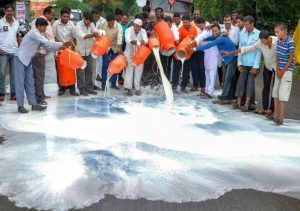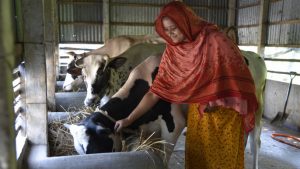A coalition of food and environmental safety groups—Stand Up to Factory Farms—leads the legislative effort. The organization hopes to establish legal protections for Oregon’s environment and communities. “We need lawmakers to stop subsidizing the industrial agriculture that is killing us and the planet and instead put money towards the transition away from the animal factory model to a humane, ecologically responsible model,” Amy van Saun, Center for Food Safety senior attorney and coalition member tells Food Tank.
The moratorium will bar mega-dairy construction until regulations are enacted to mitigate environmental and social impacts. Legislation advocates are urging Oregon lawmakers to extend the proposed moratorium indefinitely.
The proposed legislation attempts to redress negligent oversight and environmental degradation in the wake of the Lost Valley Farm disaster. In 2017, the Oregon-based mega-dairy farm committed over 200 environmental violations, including illegal waste disposal, water usage, and carcass storage. Legislative efforts failed to shut down Lost Valley Farm, which ultimately closed in a 2019 bankruptcy sale.
In response, a group of local, state, and national organizations formed the Stand Up to Factory Farms coalition to revitalize the legal battle against mega-dairy farms. The coalition proposes that Oregon policymakers study mega-dairy farms’ environmental and social impacts before awarding future operation permits.
Food & Water Watch organizer and Stand Up to Factory Farms member Emma Newton tells Food Tank, “Oregon…needs to evaluate its regulatory program which clearly failed to prevent significant impacts from the former Lost Valley Farms mega-dairy.”
If passed, the new laws would make Oregon the first state in the United States to impose a mega-dairy moratorium. Attempts to regulate large-scale livestock operations across the U.S. have largely been unsuccessful. A legal victory in Oregon could become a milestone in the longstanding battle to regulate monopolistic and environmentally harmful agricultural practices. As van Saun tells Food Tank, “Policymakers need to stop further consolidation of the industry and use our antitrust laws to bust up monopolies in agriculture in general, and animal agriculture specifically.”
Newton remains optimistic about the coalition’s efforts, telling Food Tank, “Oregonians support transformative approaches to greenhouse gas reduction in alignment with our local small dairy farmers that ensure economically disadvantaged communities, communities of color, and Indigenous communities do not continue to disproportionately bear the burden of pollution and climate disruption from the dairy and industrial livestock sectors.”













